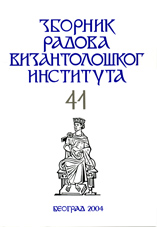Берија у политици Стефана Душана
Berroia In Stefan Dusan's Politics
Author(s): Ljubomir MaksimovićSubject(s): History
Published by: Vizantološki institut SANU
Summary/Abstract: Being one of the most important cities in Macedonia, Berroia automatically entered the horizon of Serbian politics once Stefan Dusan got involved into the Byzantine Civil War during the forties of the fourteenth century. The King's previous invasion of Macedonia, in the thirties, had been aimed directly towards Thessalonike and was a failure. Thus, in the second phase of his politics, in which Macedonia was used as a backing in the striving for the Empire, Thessalonike was temporarily left aside, although not before first Serres and then Berroia had been captured, so as to leave it completely isolated. Initially, it was Serres rather than Berroia that Dusan was focused on, its conquest in September 1345 leading immediately to the proclamation of the Empire. Afterwards - in the first half of 1346 - Berroia was also conquered and turned into an important Serbian stronghold, Thessalonike being thus cut off, which enabled the Serbs to await a more favorable time to capture it. At the same time, the conquest of Berroia paved the way for the Serbian invasion of Epirus and Thessalia. Emperor John VI Cantacuzenus was certainly aware of the consequences of such a strategic constellation. Thus, when he finally managed to neutralize the Zelots in Thessalonike, his first move towards the change of the situation was to recuperate Berroia and surrounding towns. This was such a severe blow for the Serbs, that it immediately became clear that even Dusan's imperial power might be endangered if his position in Macedonia further weakened. He reacted promptly and recaptured Berroia and other strongholds he had lost. The conquest of Berroia was lead by the nobleman Radoslav Hlapen, who first acted as a governer on behalf of Dusan, and after the death of the Emperor practically as an independent ruler of that part of Macedonia.
Journal: Зборник радова Византолошког института
- Issue Year: 2004
- Issue No: 41
- Page Range: 341-352
- Page Count: 12
- Language: Serbian

